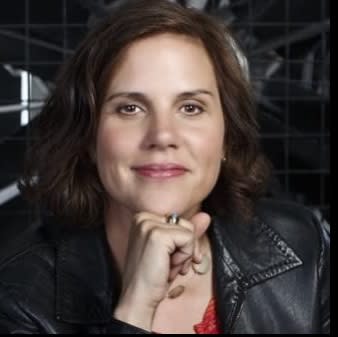Climate Warriors Get Film, TV Productions To Embrace Strategies That Will Cut Their Carbon Footprints

Behind the glitz and glamour of film production, there are an increasing number of eco warriors in the industry who are tirelessly working behind the scenes to ensure not only that productions become more environmentally sustainable long term, but are also engaged in educating the sector and promoting climate storytelling on screen.
Emmy-winning and Oscar nominated producer Lydia Dean Pilcher, who founded New York-based production company Cine Mosaic, was one of the earliest advocates for sustainability in the entertainment sector. After becoming a mother, and inspired by Al Gore’s 2006 documentary An Inconvenient Truth, the producer-writer-director — whose credits include The Darjeeling Limited, Queen of Katwe and Radium Girls (a climate narrative that she co-directed) — immediately felt compelled to be an ambassador for greener solutions in the industry.
More from Deadline
George Miller Says "There's Certainly More Stories" In The 'Mad Max' World - Cannes
Ingmar Bergman Movie Starring Robert Gustafsson In Works From SF Studios - Cannes
DDA Bolsters Awards Offering With Hire Of AMPAS Exec Carola Ash

She trained at Gore’s The Climate Reality Project before co-founding the Producers Guild of America’s PGA Green and GreenProductionGuide.com, an online industry tool kit designed to reduce the film, television and streaming industry’s carbon footprint and environmental impact. Pilcher also serves as a chair of the Directors Guild of America’s Sustainable Future Committee, and was one of the earliest U.S. producers to measure carbon footprints on productions after receiving a grant from the Alliance of Climate Protection, which she first tested out with her colleague Mari-Jo Winkler on Sam Mendes’ 2009 Focus Features production Away We Go, which Winkler was also executive producing. Shortly after that, she kickstarted the sustainability committee at the PGA.
“We’ve gone through a big shift from where we started,” says Pilcher. “Right now, the climate crisis has accelerated and more and more people in their daily lives have had some touchdown to floodings or wildfires or pollution that requires masks, so now it feels like people are really on board to be greener with their choices. Climate denialism is not a thing for anybody’s who’s in touch with what is going on.”
In 2014, Pilcher realized the industry needed an action plan and the PGA released a call to action. “We realized we couldn’t just be talking about plastic water bottles and recycling — we needed to be doing something bigger with energy. It was abundantly clear to us that we needed to transition to electrification in our industry.” The PGA then gave a clear set of recommendations on best practices to achieve those goals and it now hosts an inter-guild Sustainability Alliance, which includes all the major unions in the U.S. industry.
“It’s a powerful group,” she says. “We are living in a climate-altered reality and it’s going to be a climate-altering future, and we have to think about what we can do to just keep it from going further. Clean energy transition is super important and that’s really what we’re putting all of our energy into.”
Emellie O’Brien, founder and CEO of Earth Angel, is another pioneer in the sustainable filmmaking evolution, having worked on more than 160 major films, television series and commercials since 2011 to reduce their environmental impact. Her sustainability leadership on The Amazing Spider-Man 2 was hailed as one of Sony Pictures’ most eco-friendly blockbusters. In 2013, she founded Earth Angel to expand her expertise and impact and has since worked on projects such as Darren Aronofsky’s The Whale, AppleTV+’s Severance and Martin Scorsese’s Killers of the Flower Moon.
“I knew what a powerful medium this was and really wanted to help leverage it toward educating folks on these important issues,” says O’Brien. “It wasn’t until I got onto my first professional film set where my eyes were really opened to the amount of resource inefficiency that was happening.”
O’Brien emphasizes the importance of education, collaboration and transparency, highlighting the need for better resource management practices and including reducing waste and fuel consumption and prioritizing sustainability in the initial planning stages.

While she admits the film and TV industries aren’t the biggest polluters in the world, she points to the lack of data as an alarming signal. “What we do know is that we ultimately produce a luxury good and there is a ton of opportunity to be reducing that impact and the amount of emissions that we’re seeing on these projects is quite staggering.”
Like Pilcher, initial conversations with budget-conscious producers were challenging when Earth Angel first set out: “I had phone calls with producers after we laid out our whole program who said to me, ‘I’m not here to save the planet, I’m here to make a TV show.’”
That mindset is starting to change, she says. “I typically tell producers to think of us as their sustainability department. In the same way that most productions have specific departments, we function very similarly.” These plans are bespoke to each production and tracked through a production’s life cycle.
But how does one persuade budget-conscious producers to integrate a sustainability department into their budget at the planning stages when the wider assumption is that greener solutions can often be more expensive in the current age?
“We have to show numbers in ways that make sense for what we communicate, which doesn’t always align with how production budgets are structured,” says O’Brien. “So, that’s been a challenge over the years, but we have been able to show how there are savings.”
She points to reuse strategies for materials as more cost effective than calling in dumpsters as an example. In A24’s The Whale, they were able to repurpose the entirety of the house set. She credits Aronofsky as an “enormous advocate” of sustainable productions. “When you have the luxury of having talent involved advocating this, it goes a long way.”
Education, she adds, is paramount and O’Brien points to “great resources” such as Pilcher’s GreenProductionHub.com and BAFTA albert (more on that later) as good places for production teams to start.
“The number one thing that makes sense to me is to donate your food,” says O’Brien. “Figure out a plan to donate your food because you’re going to save money and you’re not spending as much in waste removal.”

Last year in the U.K., the British Film Institute announced a package of industry support to its new BFI National Lottery Sustainable Green fund, investing, £586,755 ($724,839) into two industry leader programs — Julie’s Bicycle and BAFTA albert — in a bid to help the U.K. industry tackle the climate and ecological crisis. At the same time, the public funding body hired Keir Powell-Lewis into the newly created role of Head of Environmental Sustainability at the BFI.
Julie’s Bicycle provides a range of free resources and tools for BFI supported projects, such as the Green Cinema Toolkit to help projects track their impacts while BAFTA’s albert has extensive experience in delivering screen industry production and editorial training. BAFTA albert’s carbon calculator was first developed within the television productions sector, where it is widely adopted, but now is making a push into the film sector. All feature productions backed by the BFI as well as co-funding bodies such as BBC Film and Film4 are all required to seek BAFTA albert certification.
Powell-Lewis notes that an industry consultation with BritainThinks found that “environmental sustainability is really important to the sector, but no one really knows whose job it is.”
“It feels like one of those topics that everyone knows is important but no one feels that they can fix themselves in a way that is meaningful,” he says. The BFI made it a strategic principle for BFI-backed projects to meet sustainability criteria. “When we did this, we knew we needed to give these projects the support to do that.”
It partnered with BAFTA albert to ensure the training and resource provider was able to support the industry in managing and reducing its carbon footprint effectively across all areas. “We needed to bring people together to tackle sustainability almost as a pre-competitive issue so that we’re able to make a step change, rather than just tinkering around the edges.”
Powell-Lewis points out that “the greenest solution is not always the more expensive solution,” and found that when it came to productions, there was a real issue with “overspeccing of power generation.”

“Some of the data we got suggests that people are overspeccing on power to the tune of about 80%. So, we know that the energy draw on grid connections is somewhere in the region of 18-22% of what they were speccing on their generators, and that’s a huge education piece for us.”
The BFI is also in the early stages of a project with ITV to decarbonize on location production and make grid connections across the U.K., which Powell-Lewis says is a “real collaborative effort.”
Matt Scarff, managing director of BAFTA albert, stresses that there are “a lot of myths around the world of sustainability” and the organization prides itself on training people how to frame questions around making every section of a production greener.
“It feels like the load right now is on a sustainability specialist within, but actually it should be everybody’s responsibility,” he says.

Storytelling, meanwhile, also has a crucial role to play when it comes to changing perception in the business. Pilcher, who is a convener of 60 climate storytelling organizations in the industry “all working in different facets of the research”, says she’s seeing a movement in Europe and the U.S. when it comes to representing climate storytelling.
“It’s really an underutilized solution,” she says. “Toxic chemical companies and fossil fuel companies have known for a long time that they were contributing to planetary damage and that’s one of the reasons that climate storytelling is important because they’ve squeezed it out of our screens.”
And it doesn’t have to be dystopian storytelling that makes audiences feel “helpless and have feelings of anxiety,” she says.
“What we’re trying to say is that we can do this, and come up with solutions and we can work together, and we can have agency and you will feel so much better about your world if you lean into it.”
Best of Deadline
2024-25 Awards Season Calendar - Dates For Oscars, Tonys, Guilds, BAFTAs, Spirits & More
2024 Premiere Dates For New & Returning Series On Broadcast, Cable & Streaming
Sign up for Deadline's Newsletter. For the latest news, follow us on Facebook, Twitter, and Instagram.

